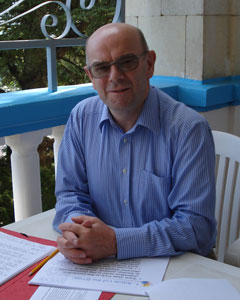
Biology and chemistry for peace not war
 In this short talk,Malcolm Dando looks at the challenges of ensuring the potential of modern biotechnology is used for peaceful purposes and does not become a new weapon of war. He discusses briefly the history of biological and chemical weapons from the first world war onwards. He focuses on the importance of the 1975 Biological and Toxin Weapons Convention (BTWC) and 1995 Chemical Weapons Convention today.
In this short talk,Malcolm Dando looks at the challenges of ensuring the potential of modern biotechnology is used for peaceful purposes and does not become a new weapon of war. He discusses briefly the history of biological and chemical weapons from the first world war onwards. He focuses on the importance of the 1975 Biological and Toxin Weapons Convention (BTWC) and 1995 Chemical Weapons Convention today.
He discusses the role of national legislation, internatioinal action and individual responsibility. For individual researchers in this area it is crucial that they are aware of their responsibilities and are vigilant about the implications of the work they do.
The huge revolution of biotechnology also offers unwelcome opportunities for a wider range of people to develop new weapons. This requires better education for scientists about these issues and the challenges if poses for openness in science. He also discusses the issues around DIY biology and bioterrorism,
Listen here (this may take a little time to load):
Please respond to a 60 sec survey after listening - Click here to take survey
The running order for the podcast is as follows:
In the past: 0 - 3 minutes 0 seconds
In the future: 3 min 0 sec - 5 min 47 sec
The scientific community: 5 min 47 sec - 9 min 37 sec
DIY biology and bioterrorism: 9 min 37 sec - end
Further reading
Dando, M.R. (2006) Bioterror and Biowarfare: A Beginners Guide. Oneworld, Oxford.
Wheelis, M., Rozsa, L. and Dando, M.R. (Eds.) (2006) Deadly Cultures: Bioweapons Since 1945. Harvard University Press, Harvard.
Kelle, A., Nixdorff, K. and Dando, M.R. (2012) Preventing a Biochemical Arms Race. Stanford University Press, Stanford.
Links
The Biological and Toxin Weapons Convention
The Genomics Gateway
Non - lethal Weapons Project
Bradford Disarmament Research Centre
Bradford Project on Strengthening the Biological and Toxin Weapons Convention
Preventing Chemical Warfare: Strengthening the Chemical Weapons Convention
About
Malcolm Dando is Professor of International Security in the Department of Peace Studies at the University of Bradford.
He trained originally as a biologist and after a period in Operational Research joined the Department of Peace Studies in 1979. In Bradford he has worked on issues of arms control, first concentrating on nuclear arms control and then, since 1991, increasingly on biological arms control. Most recently, his work has focussed on education and awareness raising amongst life scientists.
He is co-director of the department's project on strengthening the Biological and Toxin Weapons Convention. He has published widely on biological warfare, bio-terrorism, non-lethal weapons and related international security issues. He is a fellow of the Institute of Biology.
He has also spent time as the International Institute for Strategic Studies Senior Fellow at the Center for Global Security Research in Lawrence Livermore National Laboratory in California.
His publications include The New Biological Weapons (Lynne Rienner, 2001) and Preventing Biological Warfare (Palgrave, 2002).
Usage
This podcast is unrestricted in non-commercial use (for commercial purposes or in commercial organisations permission is needed). If in doubt please contact Geoff Tansey. Please let him know if you use this material, especially educational users, and in what ways. This feedback will help in taking this 'virtual academy' work further - as would offers of or suggestions for funding to help its further development. If you want to arrange for follow-up discussions for a class with Malcolm Dando via the internet – over Skype or some other service - please contact him.